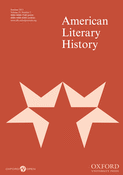-
Views
-
Cite
Cite
Nan Z. Da, Transnationalism as Metahistoriography: Washington Irving's Chinese Americas, American Literary History, Volume 25, Issue 2, Summer 2013, Pages 271–293, https://doi.org/10.1093/alh/ajt016
Close - Share Icon Share
Extract
In the April 1872 issue of Shen Bao, China's flagship private newspaper, a loose translation of “Rip Van Winkle” was published under the title “A Sleep of Seventy Years 一睡七十年.” Possibly the first piece of American fiction in China, “A Sleep of Seventy Years” appears without any paratextual information or mention of Washington Irving, a mere sliver of a story sandwiched between an admonition about hearsay and gossip and a report on the violations committed by British missionaries on the Yangtze River. The story itself bridges these two articles by addressing historical crisis and the way such news is often delivered. In “A Sleep,” Wei finds himself in an oasis in the mountains where he is met by three Daoist saints. After imbibing their liquor, the young scholar falls asleep only to wake up 70 years later. Bearing the distinct imprint of “Rip Van Winkle,” Wei only registers the passage of time when he notices that his rifle (火枪) has rotted. Like Rip, he returns to a village where everyone else has aged. Wei learns that he has completely bypassed the domestic life into which he thinks he had just entered (his wife and son have already died), discovering that his newfound social identity is consigned to nostalgic chit-chat. “A Sleep of Seventy Years” might pass as any other folktale but for two important clues: the modern rifle and the specificity of 70 years. Like “Rip Van Winkle,” this tale capitalizes on the structural suitability of a before-and-after story for conveying pessimism about contemporary historical happenings without having to go into details. Only here, the historical referents are changed: the 20 years of Rip Van Winkle's slumber becomes the 70 years of European incursion into China, including the punitive and humiliating Opium Wars and the unequal treaties that followed1; the American Revolution blanked out by Rip becomes the death throes of the Qing dynasty for Wei.




